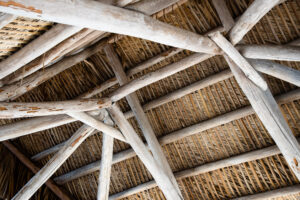By Cameron G. Woodward, Florida Land Use & Zoning, Code Enforcement Attorney
Many, if not all, visitors and residents in Florida have at one point enjoyed a meal or tropical beverage relaxing under a Chickee Hut, also known as a rethatch “Tiki Hut” or “Tiki Bar.” Such huts have become synonymous with living in paradise, and many residents and businesses have added them to their properties to increase their home’s beauty and usability. However, many are unsure what, if any, regulations apply to such structures, with some even incorrectly assuming there are no regulations at all.
What Is a Chickee?
“Chickee” is the word that Seminole Indians used for “house.” Today, under 553.73(10)(i) Florida Statutes, Chickees, defined as
“open-sided wooden hut that has a thatched roof of palm or palmetto or other traditional materials, and that does not incorporate any electrical, plumbing, or other non-wood features,”
are exempt from the Florida Building Code if constructed by the Miccosukee Tribe of Indians of Florida or by the Seminole Tribe of Florida.
Unfortunately, many have interpreted this exemption to mean that so long as a member of one of the Tribes constructs the Chickee they can essentially build them anywhere without issue. This assumption is factually incorrect, and many property owners have found themselves on the wrong side of a Florida Code Enforcement action due to this belief.
Local Regulations & Permitting


Under side of a thatch tiki hut roof
Although Chickee Huts do not require permits, nor do they need to comply with the Florida Building Code, they do need to comply with local regulations such as property setbacks and zoning requirements regarding accessory structures. Consequently, it is imperative that a property owner seeking to have a Chickee Hut constructed on their property ensure that its proposed location complies with all applicable local regulations. Further, those seeking to add electrical and/or plumbing to the chickee (installing an outdoor kitchen, for example) must ensure that those additions are properly permitted as they fall outside the above statutory exception.
What To Do Next
If you are considering having a Chickee Hut constructed at your home or business, contact a code enforcement, or Land Use lawyer at Woodward, Pires & Lombardo today to make sure all legal issues are addressed prior to building so that you can enhance and enjoy more of the Florida lifestyle.
About the Author


Cameron G. Woodward, Esq.
Cameron Grant Woodward, Esq. is a Naples native graduating from Naples High School before attending Stetson University in Deland, Florida, and then Ave Maria School of Law in Naples. Cameron proudly joins his father, Mark J. Woodward, Esq. and Uncle, Craig R. Woodward, Esq. at Woodward, Pires & Lombardo, P.A. His law practice focuses on real estate law, code enforcement, land use and zoning, landlord-tenant law, evictions, local government law, and estate planning. He is a graduate of Leadership Marco by the Marco Island Chamber of Commerce.
Related post: You Received a Notice of Violation from Code Enforcement. What’s Next?
See this article in SWFL Health & Wellness Magazine.
